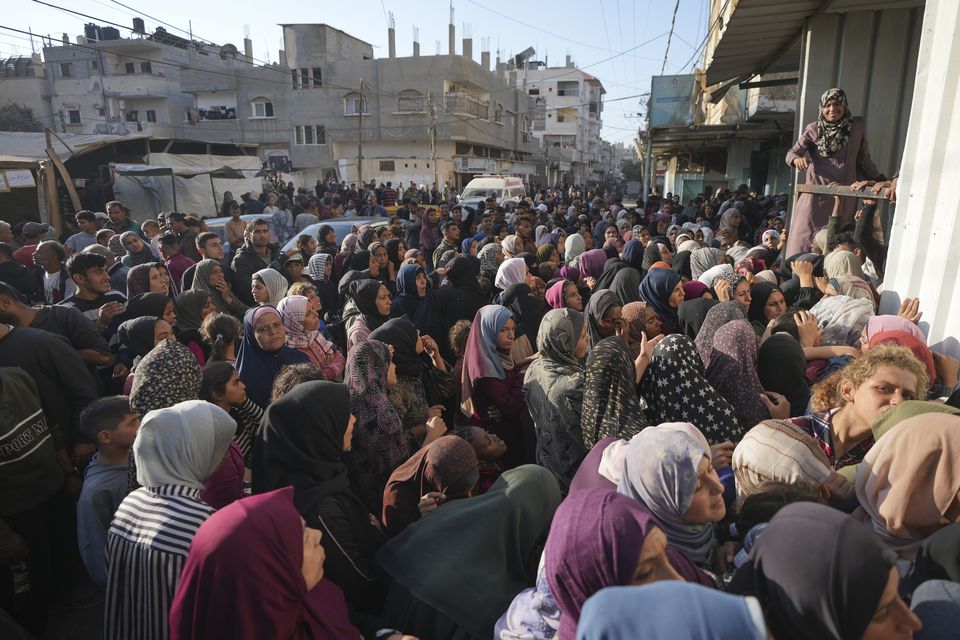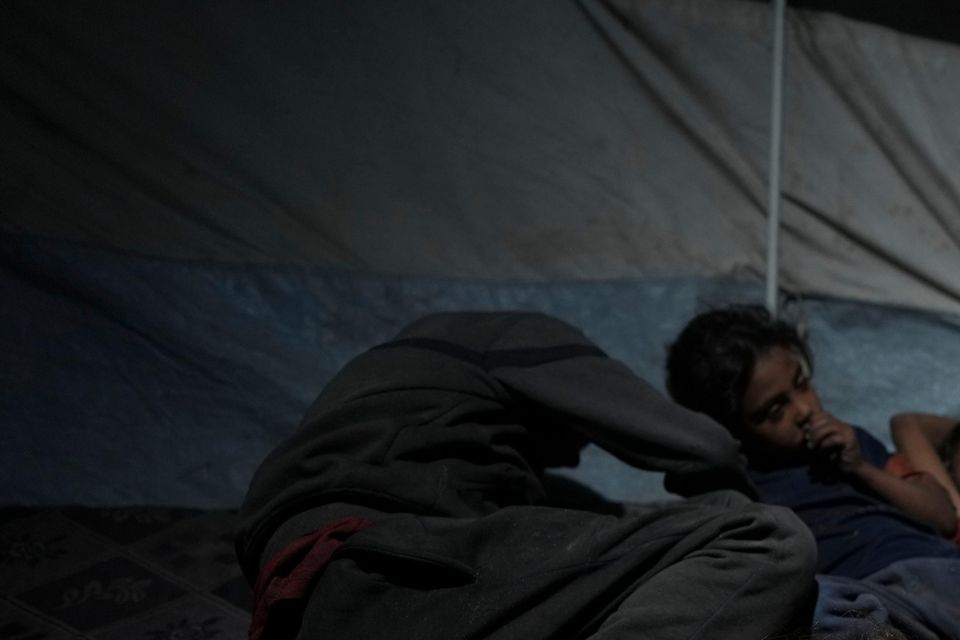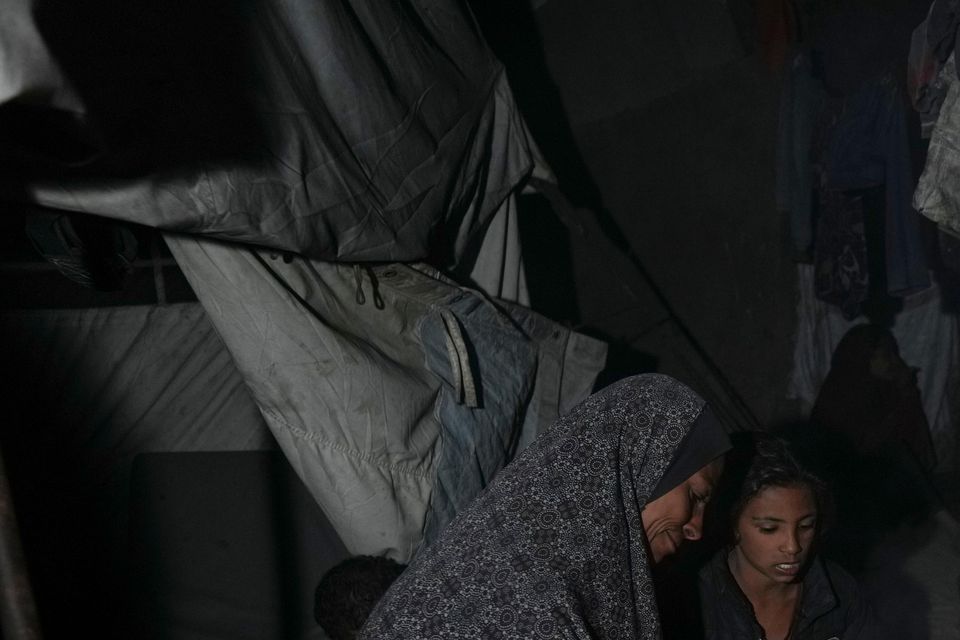The UN agency for Palestinian refugees said on Sunday that it is halting aid deliveries through the main cargo crossing into Gaza because of the threat of armed gangs who have looted recent convoys.
The decision could worsen the humanitarian crisis in Gaza as the cold, rainy winter sets in, with hundreds of thousands of people living in squalid tent camps and reliant on international food aid.
Experts were already warning of famine in the territory’s north, which Israeli forces have almost completely isolated since early October.
Philippe Lazzarini, the head of UNRWA, the main aid provider in Gaza, said the route leading to the Kerem Shalom crossing from Israel is too dangerous on the Gaza side.
Armed men looted nearly 100 trucks travelling on the route in mid-November, and he said gangs stole a smaller shipment on Saturday.
A crowd gathers in front of a bakery to get a share of bread in Deir al-Balah, Gaza Strip (Abdel Kareem Hana/AP)
Earlier, overnight Israeli strikes on the Gaza Strip killed at least six people, including two young children who died in the tent where their family was sheltering, medical officials said on Sunday.
The strike in the Muwasi area, a sprawling tent camp housing hundreds of thousands of displaced people, also injured the children’s mother and their sibling, according to the nearby Nasser Hospital.
A separate strike in the southern city of Rafah, on the border with Egypt, killed four men, according to hospital records.
The Israeli military said it was not aware of strikes in either location. Israel says it only targets militants and tries to avoid harming civilians, but its daily strikes across Gaza often kill women and children.
A former top Israeli general and defence minister has accused the government of ethnic cleansing in northern Gaza, where Israeli forces have been waging the latest in a series of offensives against Hamas since early October.
The army has sealed off the northern towns of Beit Hanoun and Beit Lahiya, and the Jabaliya refugee camp, and allowed almost no humanitarian aid to enter.
Tens of thousands of people have fled, while the United Nations estimates up to 75,000 remain and experts have warned of famine.
Children sleep in their tent at a camp for displaced people in Deir al-Balah, Gaza Strip (Abdel Kareem Hana/AP)
Moshe Yaalon, who served as defence minister under Benjamin Netanyahu before quitting in 2016 and emerging as a fierce critic of the prime minister, said the current far-right government is determined to “occupy, to annex, to ethnically cleanse”.
Pressed by an interviewer with a local news outlet on Saturday, he said: “There is no Beit Lahiya. No Beit Hanoun. (They are) operating now in Jabaliya, and (they) are actually cleaning the territory of Arabs.”
Mr Yaalon reiterated the remarks in an interview with Israeli radio on Sunday, saying “war crimes are being committed here”.
Mr Netanyahu’s Likud party criticised his earlier remarks, accusing him of making “false statements” that are “a prize for the International Criminal Court and the camp of Israel haters”.
The ICC has issued arrest warrants against Mr Netanyahu, another former defence minister, Yoav Gallant, and a Hamas commander, accusing them of crimes against humanity. The International Court of Justice is investigating allegations of genocide against Israel.
Israel rejects the allegations and says both courts are biased against it.
The war began when Hamas-led militants stormed into southern Israel on October 7 2023, killing some 1,200 people, mostly civilians, and taking around people 250 hostage. Some 100 captives are still being held inside Gaza, around two-thirds of whom are believed to be alive.
Israel’s retaliatory offensive has killed more than 44,000 Palestinians, more than half of them women and children, according to Gaza’s Health Ministry, which does not say how many of the dead were combatants. Israel says it has killed more than 17,000 militants, without providing evidence.
A displaced family sit round the fire in their tent at a camp in Deir al-Balah, Gaza Strip (Abdel Kareem Hana/AP)
The war has destroyed vast areas of the coastal enclave and displaced 90% of the population of 2.3 million, often multiple times. Hundreds of thousands have crammed into squalid tent camps, where conditions have worsened as the cold, wet winter sets in.
#Israel reached a ceasefire with Lebanon’s Hezbollah militants last week that has largely held, but that agreement, brokered by the United States and France, did not address the ongoing war in Gaza.
The US, Qatar and Egypt have spent much of the past year trying to broker a ceasefire in Gaza and the release of the remaining hostages, but those efforts stalled as Israel rejected Hamas’s demand for a complete withdrawal from the territory.
The Biden administration has said it will make another push for a deal in its final weeks in office.
US President-elect Donald Trump has vowed to end the wars in the Middle East, without saying how. He was a staunch defender of Israel and its policies toward the Palestinians during his previous term.


